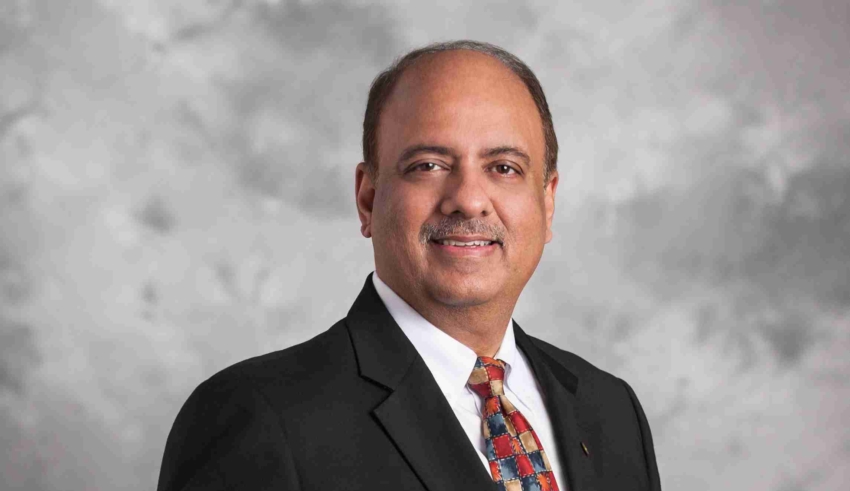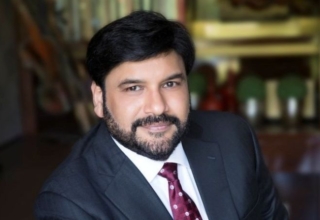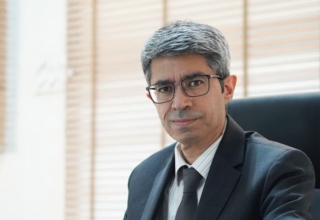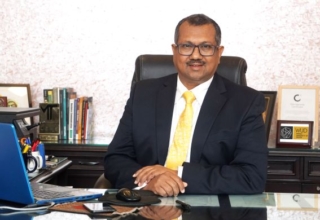
Shekhar Mehta, business leader and philanthropist who is the Chairman and founder Skyline Group, on June 30 assumed the office of Rotary International President for a period of one year. A member of the Rotary Club of Calcutta-Mahanagar, he is the 111th president of the 116-year-old service organization with 1.2 million Rotary members globally and for record is also the 4th Indian to hold this chair.
Curriculum Magazine did an email interview with him to know his priorities vis-a-vis children and youth
How does it feel to be heading one of the premier global humanitarian service organizations at a time, when Covid-19 pandemic, climate change and conflicts in various parts of the world—all are posing formidable challenges to humankind?
It’s a privilege for me to lead Rotary’s global network of 1.2 million volunteers – women and men dedicated to improving lives and bringing positive, lasting change to communities around the world.
While a new Rotary International president is elected every year, our core values remain constant. My vision for Rotary is to support projects and initiatives that leave a long-lasting impact across communities.
As health experts predict a third wave of Covid-19, our immediate goal will be helping health authorities communicate lifesaving information about Covid-19 and vaccination, combating misinformation, supporting fair and equal access to vaccines, and curbing the spread of the virus by donating protective gear and other supplies to clinics and hospitals that are under strain.
Disease prevention has been one of Rotary’s key focus areas for decades. As a founding partner of the Global Polio Eradication Initiative (GPEI), Rotary has been a key driver behind efforts to eradicate polio worldwide for more than 30 years. One of the most successful public-private partnerships for global health to date, the GPEI has reduced polio cases worldwide by 99.9 percent, and Rotary has contributed more than US$2.2 billion to fight polio.
Besides helping to bring an end to the pandemic, one of my main priorities this year is to focus on improving the health, education, wellbeing, and economic security of girls across the globe. That means supporting them to ensure that their basic needs are met while working to transform the structures and institutions that reinforce and perpetuate gender discrimination and inequality. To that end, I’m encouraging our members to prioritize projects that support girls’ access to health care and nutrition; water, sanitation, and hygiene resources; and that prevent their exploitation, neglect, and physical and emotional violence and more.
Can you elaborate on Covid-19 response?
I’ve been inspired to see our members take action to reduce the spread of Covid-19, and help their communities respond to the many health, social and economic impacts of the pandemic. In total to date, Rotary has provided over US$46 million to support clubs in their response to Covid-19, spanning from large scale support for transformative activities such as medical equipment for hospitals – to small-scale, short-term activities like purchasing thermometers, protective medical gear, or other items for frontline medical professionals.
Under the guidance of Rotary’s India Covid Task Force, Rotary members across India are working with local governments and authorities to boost Covid-19 vaccination rollout and delivery, along with providing infrastructural support to hospitals and Covid-19 care facilities.
In response to the significant effects the pandemic has had on mental health, Rotary was one of the first organizations to set up a PAN India 24/7 helpline – Wellbeing Volunteers United (WVU) – to offer counselling to those in need.
Polio campaign supported by Rotary International and the value it created is also contributing to this kind of response?
Rotary continues to play an important role in helping India maintain its polio-free status by organizing Sub National Immunization Days (SNIDs) together with the Govt. of India every year. The infrastructure created to end poliois now being used to address other health challenges and diseases, including the Covid-19 pandemic.
Rotary is tapping into its decades of experience in bringing polio to the brink of eradication, to highlight the power and efficacy of vaccines. Our tenacity, strategic partnerships, and innovation can all support the effort to protect communities from Covid-19.
Apart from Polio vaccination, can you tell us, what are some known engagements’ of Rotary International in India?
We are proud to reflect on the positive impact we’ve created in last 100 years in India and will continue to support the Govt. in its efforts to achieve the United Nations Sustainable Development Goals on healthcare, literacy, environment, and water and sanitation.
While ending polio globally—and maintaining India’s polio-free status–remains our top priority,weare working to prevent and treat diseases; improve maternal and child health; provide access to clean water and sanitation; protect the environment, support education, grow local economies and reduce poverty and conflict worldwide.
Currently, Rotary clubs in states like Tamil Nadu, Kerala and Maharashtra are helping local authorities in setting up centres for immunization, thereby providing preventive care. The other aspect is providing palliative care for those who have suffered or are suffering from Covid-19, by setting up oxygen plants, oxygen concentrator banks and arranging for pro-bono doctors to offer free-of-cost consultation.
Since its formation in 2014, RILM has made considerable progress in teachers training and adult literacy. The Asha Kiran programme has helped enroll 40,000 children back to formal schooling; 20,000 schools have been converted into Happy Schools and 4,000 libraries have been created in government schools across India, with support from the central and state governments.
In 2016, Rotary International developed a pilot program called ‘WASH in Schools Target Challenge’ to encourage clubs to develop sustainable WASH, and education projects in schools. The pilot was launched in five countries including India. In the last four years, Rotary has implemented WASH in Schools project in over 30,000 schools with the support of state education departments and their district level officials benefiting over 1 million families. The target is to cover 1.5 lakh schools by 2025.
Being an education and youth platform, would like to narrow down this discussion to India specific initiatives like education and youth empowerment.
While India has made significant progress in improving literacy over the years, we continue to be home to 313 million illiterate people; with 59 percent of them being women.
With an estimated 750 million people over the age of 15 considered illiterate – of which two-thirds are women – and 250 million children worldwide without basic reading, writing and numeracy skills – there is much work to done.
To support the education of girls, I’d like to see clubs prioritize projects that supply menstrual health and hygiene resources; provide access to basic education, skills training, and technology; prevent or raise awareness about child labor and child marriage, and offer opportunities for girls to elevate their voices and articulate their views, ideas, and opinions.
The success of any project will be determined by systemic, cultural, and behavioral changes that result in greater gender equality and better lives for girls.
Tell us if you plan to prioritize engagement with education?
As one of our areas of focus, Rotary supports education and literacy for all children and adults.Our members support projects that provide teacher training, vocational training teams, integration of technology into classroom curriculum, and adult literacy programs to communities.
The Rotary India Literacy Mission provides a comprehensive program called “T-E-A-C-H” – a holistic literacy program that has reached more than 50,000 schools and 15 million children. We’re working with the Central Government and many State Governments to incorporate this program, which has also been replicated in Nepal and Pakistan.
This year, ourfocus will be on empowering girls by improving age-grade appropriate learning inside the classroom, teachers’ training, e-learning and skill development and by enhancing the overall school infrastructure and services.
Across India, Rotary has helped set up hundreds of schools – many of which are now catering to children who’ve lost their families during COVID-19.
That’s really good. At the same time some concern is volunteerism in India though very ancient concept, however, isn’t that well organized or professionalized. What are your views on this?
Today, there are more than three million NGOs working towards social development in India, and Rotary is proud to be part of this growing and vital sector.
We know that volunteer service is more than just a feel-good calling. Rotary’s goal-oriented, business model approach emphasizes the need for community involvement, measurable goals, and maximum impact and sustainability.
Rotary combines global reach, local resources, and highly skilled volunteers with a funding structure that distributes more than $200 million annually in support of projects that address a range of high priority world needs.
To help us better understand the vast contributions of our volunteers, a special report was prepared for Rotary International by the Johns Hopkins Center for Civil Society Studies in 2019, which found that Rotary members had volunteered a total of 5.8 million hours within a four-week survey period.
Extrapolating those results over an entire year, the report gave a conservative estimate of nearly 47 million hours of volunteer effort generated by Rotary members in a typical year. The report then analysed the economic impact of all those hours and estimated the value conservatively at $850 million a year, if communities had to pay for the services that Rotary volunteers provide.
With that report, Rotary became the first global service organization to conduct such an empirical analysis, using an internationally sanctioned definition of volunteer work.
What would be your message for children, youth, parents and teachers of India and elsewhere?
Message for children: You must prioritize education. It is the key to your future. It will enable and empower you to take informed decisions and make a difference where it matters.
Message to the youth: You should always strife for excellence. Be motivated, driven and determined to achieve your dreams. Never get disheartened by the challenges, take them up as opportunities. Life can be difficult at times but always keep moving.
Message to parents: Parents can be the biggest motivators and teachers for their kids. Most importantly, they must listen to them and encourage them to pursue their dreams.
Message to teachers:Teachers can inspire children to think and achieve to their maximum potential. Children today must be taught how to think, rather than what to think.










